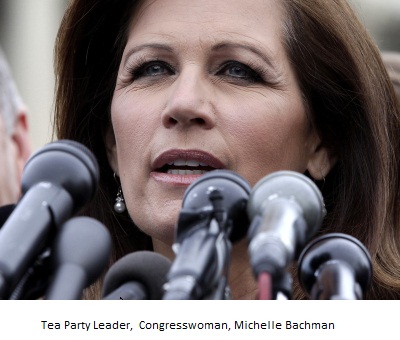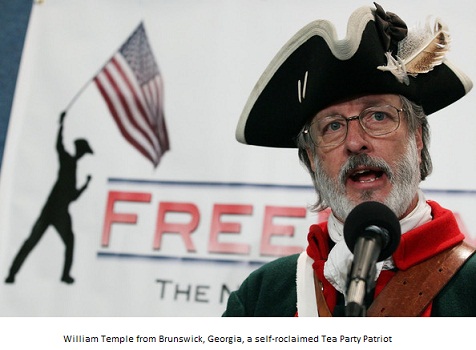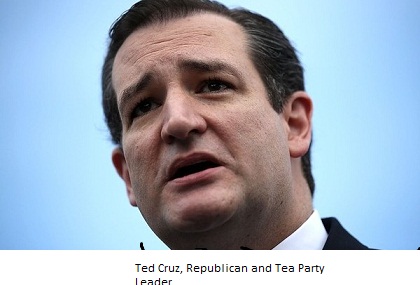CSMS Magazine
Last week, the talks in all editorial board meetings centered around whether rejectionist Republicans in Congress would go this far in their desperate fight to block, stave off and bluntly undo whatever policy that bears Barack Obama’s trademark. Tonight, there is no room for hypothetical questions, for we can fairly speak with 100% of certainty. They have threatened to shut down the government, and yesterday they made good on their threat. Although these actions are much more symbolic than substantial, they could have the potentials to paralyze, once more, an economy moving sluggishly toward the path to recovery.
It’s hard to imagine that some 60 extremists from the outer fringe of the political spectrum can hijack the core process of running a government. Just when we thought the Tea Party movement was forced underground by the ever-growing political clout of a brand new wave of liberal activisms embodied in the Occupy Wall Street movement, these rightwing lawmakers have managed to remind us that not only they’re still in the game, but also they can still throw punches with irreparable damages. Emerged from the pack, is Texas Congressman Ted Cruz, who swears that he will do eveythng to repleal Abama Care. Below is a revised article published by CSMS Magazine back in September of 2009. This is a detailed piece that I hope will shed some light over the origin of the Tea Party movement.
________________________________________________________________________
Organized by FreedomWorks under the umbrella of the Tea Party movement, a group headed by former Republican House Majority Leader Dick Armey, led thousands of rightwing activists mixed with tons of onlookers and politically dubious people to a march on the nation’s capital last Saturday (Sept. 2009) to demand lower taxes and less government spending. All this was done in a surreal atmosphere swept by anti-abortion and anti-immigrant rhetoric. But the so-called historic march to Washington signaled a dangerous precedent in the rightwing opposition to Obama. Mark Williams, a conservative radio talk show host from Sacramento who is vice-chairman of Our Country Deserves Better PAC, a political action committee that co-sponsored the march, denounced Obama for attempting to introduce “socialism” in America. His views were reinforced by other rightwing individuals who painted Obama as Hitler and questioned his status as a US citizen.
A week before the march, Williams was quoted on Politico.com as saying, “If I’ve learned one thing in 30 years of doing activist talk, it’s that you can’t manufacture this kind of thing….I could get on the radio and rant and rave until I was blue in the face, but if it’s not out there, it’s not going to happen.” It’s true there is something out there, but what’s out there is a genuine fear of economic stagnation and a serious lack of grasp on the health care debate, but not a crave for veering the country to the “Right.”
Several pillars from the Republican Party took the stage to denounce what they called “ObamaCare.” But many believe their real aim was to galvanize a serious opposition to Obama they accused of trying to “socialize” the country’s health care through his “public option” proposal in order to create a government-run insurance plan that will compete with private insurers in a newly reshuffled health care market.
Dick Armey, Republican Congressman Michael Pence of Indiana and Republican Senator Jim DeMint of South Carolina were among the speakers. Many of the speakers represented their own fringe groups, but well aware of their political insignificance—for their philosophy and political platform are for obvious reasons at odds with one and other. Consequently, they seized on the common ground: The racial dynamics surrounding a president they question his US citizenship.
To give their common ground some semblance of structure, they’re clumsily trying to fold themselves under a so-called Tea Party, a movement founded in 2007 by Rep. Ron Paul, a libertarian/Republican from Texas, who shocked the media when he unveiled the organization nomenclature during his bid for GOP presidential nomination. The name Tea Party was released, according to many rightwing watchers, as a publicity stunt designed for fundraising purposes as well as for paying tribute to the 1773 Boston tax revolt that played a major role in sparking the American Revolution. The hope here is to use “Tea”, an acronym for “Taxed Enough Already,” as a catalyst that will ultimately rescue the country from “foreign invaders.”
Tea Party actions: Buffoonish but dangerous
 Beyond their general grievances over health care and higher taxes, a blatant, revanchist attitude takes charge to herd them along. What was an unspoken consensus among rightwing conservatives few months ago has now become an overt operation aimed at fueling hatred to a society already polarized along racial lines. The underline danger is that we may be witnessing a replica of the John Birch Society in the early 1960s during the Kennedy’s presidency.
Beyond their general grievances over health care and higher taxes, a blatant, revanchist attitude takes charge to herd them along. What was an unspoken consensus among rightwing conservatives few months ago has now become an overt operation aimed at fueling hatred to a society already polarized along racial lines. The underline danger is that we may be witnessing a replica of the John Birch Society in the early 1960s during the Kennedy’s presidency.
Sam Tanenhaus, who wrote “The Death of Conservatism,” which describes contradictions and nuances within the conservative movement, predicts the Tea Party activists won’t have much lasting impact on mainstream politics. That may be true, but it also may usher a new wave of hate crimes targeting minorities and defenseless immigrants in the name of ethnic and racial cleansing. The language being used in Tea Party town hall meetings across the country is quite alarming. Painting Obama as a monkey (and we know what that means), accusing him of being a communists, and praying that he dies in office to name a few are reasons to believe this never-seen-before revanchism goes far beyond household issues such as overtaxes and big government. There are reasons here to believe the Republicans’ exclusivist attitude and the inflammatory language directed at Obama, including the prediction of his demise, are mere facts that Obama’s hope at becoming the country’s historic unifier was doomed from the start. It seems the issue here is not what the Obama administration does or wants to accomplish, but rather who the president of The United States happens to be. If that is the case, we may find ourselves in unchartered territories, advancing toward a greater polarization where the ultimate compromising point becomes as elusive as ever.
Oblivious to the plight of some 50 million Americans living without health insurance and another 100 million who have coverage through their employees’ health benefits, those anti-healthcare reform activists could not care less, even if many of them fall into the latter category. What is wrong with the “Public Option” they hate so passionately? Health Care is part of the 3 fundamental rights of Human Rights ratified by The United Nations Fourth Geneva Convention. It cannot be a commodity for big money interests. It is hard to imagine that by insuring every one of its citizens the right to health care would lead the United States toward the path to socialism.
Resurrecting John Caldwell Calhoun
 If there were any doubt about the Tea Party movement political motives, one needs to look at the philosophy of some of the rightwing groups under its cover. One sees the Whig party, one of the fringe groups under its umbrella. Drawing from the old Whig Party of the 1830s, they call themselves the Modern Whig Party, an organization made out of veteran of the Iraq and Afghan wars who stated their intention is to be a “party for the rest of us,” and their goal is to find a non-fringe “middle ground” between the Democratic Party and Republican Party. Some of them are advocating an openly rejectionist agenda of which their philosophy stemmed from the Calhoun conservatism of the 1830s.
If there were any doubt about the Tea Party movement political motives, one needs to look at the philosophy of some of the rightwing groups under its cover. One sees the Whig party, one of the fringe groups under its umbrella. Drawing from the old Whig Party of the 1830s, they call themselves the Modern Whig Party, an organization made out of veteran of the Iraq and Afghan wars who stated their intention is to be a “party for the rest of us,” and their goal is to find a non-fringe “middle ground” between the Democratic Party and Republican Party. Some of them are advocating an openly rejectionist agenda of which their philosophy stemmed from the Calhoun conservatism of the 1830s.
John Calhoun, a South Carolina politician, was a staunch advocate of slavery, nullification and the rupture of the 9th Amendment. Calhoun proslavery advocacy was so entrenched and his influence over southern politics was so enormous that many historians believe he was partially responsible for escalating Southern threats of secession in the face of mounting abolitionist sentiment in the North—although he died in 1850, eleven years before the start of the civil war. After all, the civil war started in South Carolina. In his rhetorical defense of southern slaveholders, Calhoun saw slavery as a “positive good” rather than as a “necessary evil.” All these vexing sentiments constitute the new creed of the Tea Party and its tributaries, including states’ rights under which states could declare null and void federal laws which they deemed to be unconstitutional.
As the health care debate moves to high gear, in the days to come, one can only expect more demonstrations in the like of the one staged last Saturday.
Dr. Ardain Isma is editor-in-chief of CSMS Magazine. He teaches Cross-Cultural Studies at the University of North Florida (UNF). He is a scholar as well as a novelist. He may be reached at:publisher@csmsmagazine.org


